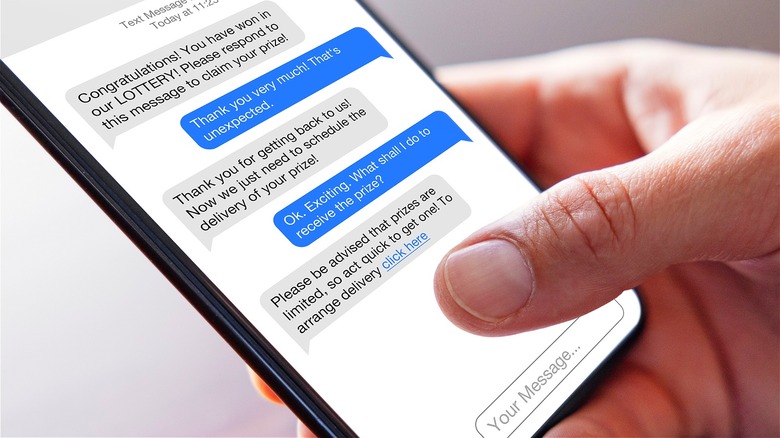How To Try And Get Your Money Back After Being Scammed
The Federal Trade Commission reports that in 2023, consumers lost $10 billion to fraud, with investment scams making up $4.6 billion of that number and impersonation scams, $2.7 billion. The FTC tracks reported fraud across the U.S. with its Consumer Sentinel Network, an interconnected web comprising state, federal, and local law enforcement agencies; the Better Business Bureau; and nonprofits. It also takes complaints directly from consumers who have experienced fraud. If we take a look at what was reported in 2023, we can get a fair idea of money scams to watch out for in 2024. Employment scams, lotteries, and online shopping fraud that use email, phone, and texting are definitely on the rise.
On that note, if you live in California, you better keep your wits about you when online or on the phone if you wish to avoid a scam. Per Forbes' analysis of FTC data, California was the fraud capital of the United States in 2023, with 46,999 reports of fraud and a median loss of $700 per person. For the top-10 scammed states, the most likely type of scam was an imposter scam, followed by online shopping and fraudulent sweepstakes or lotteries. If you find yourself the victim of a scam, here's what you can try and do to get your stolen money back.
If you've been scammed
If you've already lost money to a scam, the first thing you should do is not lose anymore. Reach out to your bank, credit card company, or credit union to report your concerns, as well as financial apps and virtual wallets. If your personal information is already out in the world, you'll want to know what you need to do to freeze your credit or set up whole new accounts to ensure your financial situation is protected. Initiating a fraud report through a credit agency (that is, Equifax, TransUnion, or Experian) is another option that will allow you to keep your accounts active and unfrozen while heightening the security around your cards. Through a series of identity verifications, a prospective scam artist would have a harder time opening any new accounts under your name. Of course, this is dependent on how much personal information they were able to get.
Whether you get new accounts and cards or not, change your passwords, especially if the scammers were also given access to your phone or computer. Simple things like updating security software and calling a service provider to update them on the situation can keep a bad situation from escalating. Report the incident to the appropriate authorities. According to the U.S. Department of Justice, that means reporting the incident to the FTC for consumer fraud/identity theft, the FBI for general fraud and other criminal matters, the police for state/local fraud, or the U.S. Postal Inspection Service for mail and sweepstakes fraud. Once you've done this, you can then look to try and retrieve the money you lost.
How to try and retrieve stolen money
If your money was stolen via wire transfer, know that this can be possibly reversed if you contact your bank or the wire transfer company you used (like Western Union) in time. As for money stolen from a bank account or credit card, financial institutions and credit card issuers can block further transactions, but they can also return money if you can prove the fraud. Even sending cash through mail might be stopped if the U.S. Postal Service can find your package before the scammer gets it. Money transfers through apps, meanwhile, can also be stopped or reversed if you catch it in time. Contact the app company, explain the situation, and cross your fingers.
While the above are steps you can take to try and retrieve money you've been scammed out of, it becomes more complicated if you were scammed out of cryptocurrency. The reason is because with crypto, you'll need the receiver to return you the funds. This is one reason why you need to be on the lookout for crypto scams. Red flags for fraud include businesses that ask for cryptocurrency upfront to purchase a product or service, big talk of huge returns on investment in short periods of time, or some random person reaching out to you online requesting crypto for investing.
If you find yourself in a situation where getting your money back is a long shot, it's understandable you may feel desperate. This said, beware recovery scammers online masquerading as businesses that specialize in returning your money. Scam artists double dip by searching keywords for desperate victims of fraud.


